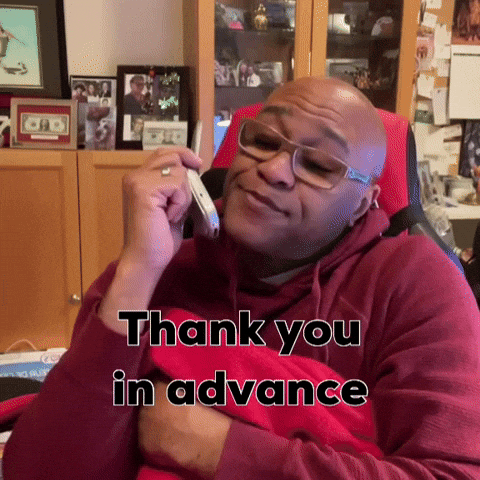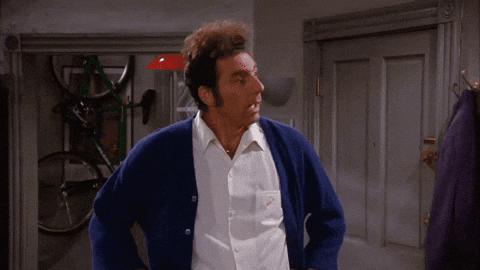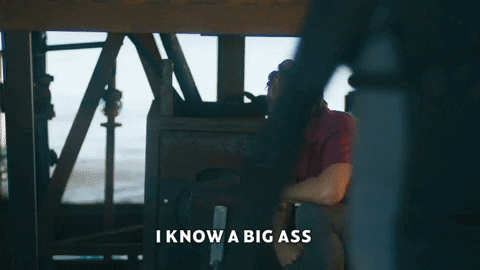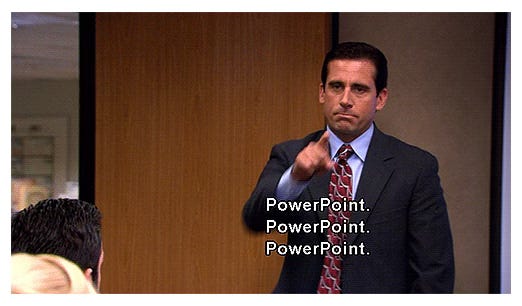The 4 Invisible Rules That Keep You Stuck (Part 2 of 2: Challenging the Rules)
Don't worry: you don't have to flip from overachievement to Michael Scott
First up, something very important: 🎉WELCOME🤗 to new readers from The Next Big Idea Club, I Dare You, Talking to Teens, Mind Love, Untangle, Beyond the Next Chapter, and Your Anxious Child! Such great conversations, such thoughtful hosts. I even had a fun homecoming at Savvy Psychologist. Whoever sent you, I’m so glad you’re here.
Next, a quick ask: if How to Be Enough made you laugh, think, reflect (or procrastinate on something else), an *honest* review on Amazon will spark the same for someone else: 1️⃣ Go to the book’s Amazon page, 2️⃣ Click the blue text that says “[#] ratings” next to the stars 3️⃣ Click the “Write a customer review” button. It can be short: “Helpful!” “Loved it!” Or just stars—you don’t have to write anything at all. 4️⃣ Bask in my gratitude! 🙏😊🌟
Ok, finally! Time for Part 2 of The 4 Invisible Rules That Keep You Stuck.
Last time on the newsletter, we walked through four rules of perfectionism that keep us stuck. These were articulated 75 years ago by the pioneering psychoanalyst Dr. Karen Horney in her final book published before her passing. They are:
Endure everything
Understand everything
Like (and be liked by) everybody
Always be productive
We may not believe these rules literally or verbatim, but most of us familiar with perfectionism feel their weight acutely.
Endure everything might manifest as: Be strong. Never give up.
Understand everything might arise as: I have to come off as smart. I can’t look like I don’t know what I’m doing.
Like (and be liked by) everybody might look like: No one should be mad at me. What will people think?
Always be productive is self-explanatory, but also often manifests as Always be improving. Make the most of every moment. Don’t waste time.
Sometimes our rules are helpful! They may be inspirational or keep us on track.
But more often, they make us feel stressed or coerced. And when we inevitably break or bend our own personally demanding version of the rules, we feel like we’ve fallen short.
What to do? Here are three ways to question rules that are no longer serving you:
One: Shift from “Have to” to “choose to.” Spoiler: your actions might remain exactly the same.
A client we’ll call James volunteers at a big local soup kitchen. He has volunteered every week for years and is dismayed by the flakiness of some of the other volunteers. “They know there are no consequences if they don’t show up. It’s not paid, so they don’t care. They know everyone else will just cover for them.”
James found himself acting out his resentment and irritation by doubling down on his own dutifulness: “I have to be a good soldier. I have to show up, no matter what.”
Consistently showing up to his shifts became a kind of self-righteous protest, and James didn’t like how the irresponsibility of others was determining his mood and actions.
Indeed, “I have to” was putting James in a low-power position where his showing up was a knee-jerk reaction to others.
So we worked on identifying what part of showing up for his volunteer shifts felt important to him. Why did he freely choose to show up reliably?
James answered easily: “I choose to show up because I respect my colleagues,” “I choose to show up because feeding these people is important to me.”
James’ actions didn’t change. He still showed up to every shift he signed up for. But the driving force behind it shifted from one of resentful overcorrection to one of personal agency and choice.
In sum, what about the task at hand is important, meaningful, purposeful, or just plain fun for you? What part of your task can you freely choose to approach?
Importantly, you can’t gaslight yourself into choosing to do something. “Have to” versus “choose to” feel very different in your mind and body. If you feel resentful or like you’re trying to convince yourself, it’s not freely chosen.
But you can find an element of “choose to” in almost any situation. You may choose to get up early to go for a run on a cold morning because you know you’ll feel good afterwards. You may choose to give a bridesmaid’s speech at your best friend’s wedding even though you hate public speaking because you value your friendship. You may choose to apologize to your partner even though you feel defensive because you know it will build healthy repair.
Like jazz or porn, you’ll recognize “choose to” when you see it.
Two: Roll back overcompensation.
What happens when you have to give a presentation, interview, conference talk, or any other form of public speaking? One client who we’ll call Omar had to give a presentation followed by a Q&A. He not only rehearsed for weeks, he also thought of every question he could possibly be asked and rehearsed the answers in front of a mirror. It took many hours over many days. In short, he over-prepared. (I totally understand Omar—I remember once preparing word-for-word answers to likely podcast questions.)
And then? Omar’s presentation went fine. But his over-preparation got the credit.
When we feel like we’re not doing well enough, it drives us to overcompensate. We over-analyze, over-think, over-work. We might be overly-friendly, overly-enthusiastic, overly-thorough, or overprotective in the process.
But then over-doing it gets the credit. We think our overcompensation is the reason we avoided failing. We don’t get the chance to learn that there was nothing in need of compensation in the first place.
But that doesn’t mean a total about-face. We don’t need to swing the pendulum all the way to having to register Powerpoint during your presentation because you’ve never opened it before. Instead, next time you give a presentation, please do prepare and rehearse, but there is an inflection point where practice and rehearsal cease to make your work better. Let yourself stop there. And when all goes well? You’ll get the credit.
Three: Follow the rule, but be flexible given the context.
Under most circumstances, our rules work pretty well. But not all circumstances are created equal. “Tell the truth” stops working when your preschooler hands you a page of scribbles and asks if you recognize Mommy, or when the aggressive guy at the bar demands to know where you live.
If your rule is working for you in your current situation, all is well. “Endure everything” might mean slogging through grad school to get your Master’s. “Always be productive” might mean planning your vacation itinerary to maximize your time. Cool. No problem.
But if the rule ceases to work—your grad school mentor is abusive, your family is begging for an unscheduled day at the pool—be flexible. Rather than asking, “Did I follow the rule?” ask, “Did I do what worked for the situation?”
Let’s sum it up: Rather than following your personally demanding rules to the point of perceived failure, exhaustion, or ineffectiveness, try something new: chase the parts of your tasks that are freely chosen and important to you, roll back overdoing things to simply doing them well, or adapt flexibly to the situation. Or all three!
Need to snag your copy of How to Be Enough: Self-Acceptance for Self-Critics and Perfectionists? Hey, there’s a button right there!
As always, be kind to others and yourself!








Taking a break from a brief presentation on happiness, what happiness means and how we find it, I have been overpreparing the core of the messaging. The topic is vast so the question for me was what can you say in a brief period of time, using PowerPoint support. I'm overthinking the whole thing. I want it to be perfect so that the students walk away with: "Wow that was awesome." It has occurred to me, that what I say and present is important but more important is that I am relax and remember this is an attempt to plant some thoughts about how in their crazy world of stress, schedules, the need for belonging and friends, the struggle at times with relationships or feeling of self worth how to create moments of joy and peace. Time to wrap it up after two hours and with a brief PowerPoint to just bring it to these students on Wednesday with a sense of ease. Thanks for the post Ellen. Just in the first chapters of your new book. Kevin